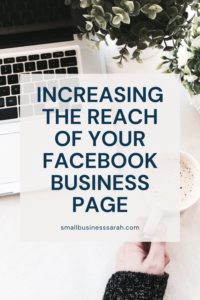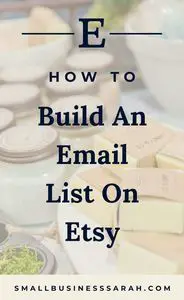There are a lot of ways to market your Etsy shop. You could share your products on social media (e.g., Instagram, Facebook, YouTube, Pinterest, even TikTok), collaborate with influencers, host giveaways, book yourself on podcasts, or run ads on Etsy.
The challenge is that all of these places are “noisy,” and it’s difficult to get attention. That’s one of the benefits of using email marketing for your Etsy shop. Email allows you to build the know, like, and trust factor and speak directly to your customers. In this post, we’ll cover some smart ways to utilize email marketing for your Etsy shop.
This post contains affiliate links. For more information, please see my disclosures.
Email Marketing Best Practices For Etsy Sellers
As with most business principles, there are best practices for email marketing. But much of the training on email marketing best practices focuses on giant brands like Macy’s, J. Crew, or Old Navy. You expect these massive stores to email every day and try to get you to buy something.
But this type of approach doesn’t usually work as well for small handmade shops. Your customers probably don’t want you to market your business to them every single day.
In addition to expectations, there are major practical realities. Big brands have a marketing department with a budget for copywriters, graphic designers, stylists, and photographers who churn out the content for daily sales emails.
Chances are you don’t have all those resources for your Etsy shop. That means you need a different approach, one that’s more focused on showing how you can serve your customer.
How To Use Email Marketing For Your Etsy Shop
If you want to use email to grow your Etsy shop, you need to be strategic about what you send. You can’t just send emails that are all about selling. Instead, you need to write emails that will serve your customers and show them how your products can help improve their lives. Let’s look at some practical ways to do that.
Introduce Them To Your Products
This could include a new product line you’re launching or an upcoming sale or holiday promotion. The key is your email needs to make clear what the benefits are for your customers. They’re wondering what’s in it for them. Make sure you tell them about the benefit of your products rather than just the features.
Stories also work well to introduce your products. Tell the story of how what you sell made a difference for one of your customers.
A Peek Behind-The-Scenes
Not every email you send has to be focused on selling. For example, people enjoy seeing what goes on behind the small businesses they buy from. Share some photos or short videos of yourself in your element.
These types of behind-the-scenes emails can help people feel connected to you because they can picture you fulfilling their order. Images and videos also help build the know, like, and trust factor, which can have an impact when people are making purchasing decisions.
Share A Freebie
People like getting things for free. Sending your subscribers something like a free printable or instructions for a DIY project can help people get excited about your business.
Seasonal Content That Highlights Your Products
Creating content that can help your customers get more out of their purchase will help you create loyal customers. This could be blog posts or videos that give people ideas of how to use your products for birthdays, back to school, Thanksgiving, or other holidays.
Share Products That Complement What You Offer
Combining efforts with other creators can be a great way to grow your customer base and introduce your products to new people. Just make sure that you set clear expectations when you begin working with others.
Tell People About Upcoming Events Or Craft Shows
If you sell at events or craft shows, this can be a great way to meet your customers in person. In addition, you could ask people if they’d be willing to have their photo taken with you so you could use it in your marketing (be sure to get their permission).
Events and shows also give you the opportunity to connect with other makers and potentially collaborate. You can share great products you discover with your audience and vice versa.
How Often Should You Email Your List?
Generally, a good place to start is to send an email once a week or every other week. Emailing more than once a week can feel overwhelming if your business is still small and you don’t have a team, and less than once a month makes it easy for people to forget who you are.
The key is to be consistent. If you regularly show up in their inbox with interesting ideas and helpful tips, people are more likely to remember you when they’re ready to make a purchase.
A Potential Mindset Issue
A lot of business owners are uncomfortable sending emails because they don’t want to bother anyone.
But here’s the thing. You’re running a business and have something valuable to offer to people. You don’t have to email them every day, but reaching out to them once a week or every other week is a good way to keep your business top of mind.
If people unsubscribe because you email them each week, they probably aren’t the right people for you. I know it seems hard at first, but don’t take unsubscribes personally. You want to focus your attention on the people you can help.
Start Building Your Email List
Now that we’ve covered some of the different emails you can send, it’s time to take action. Your next step is to build a landing page to start collecting email addresses. If you’re not quite sure how to do that, be sure to check out the tutorial here.


